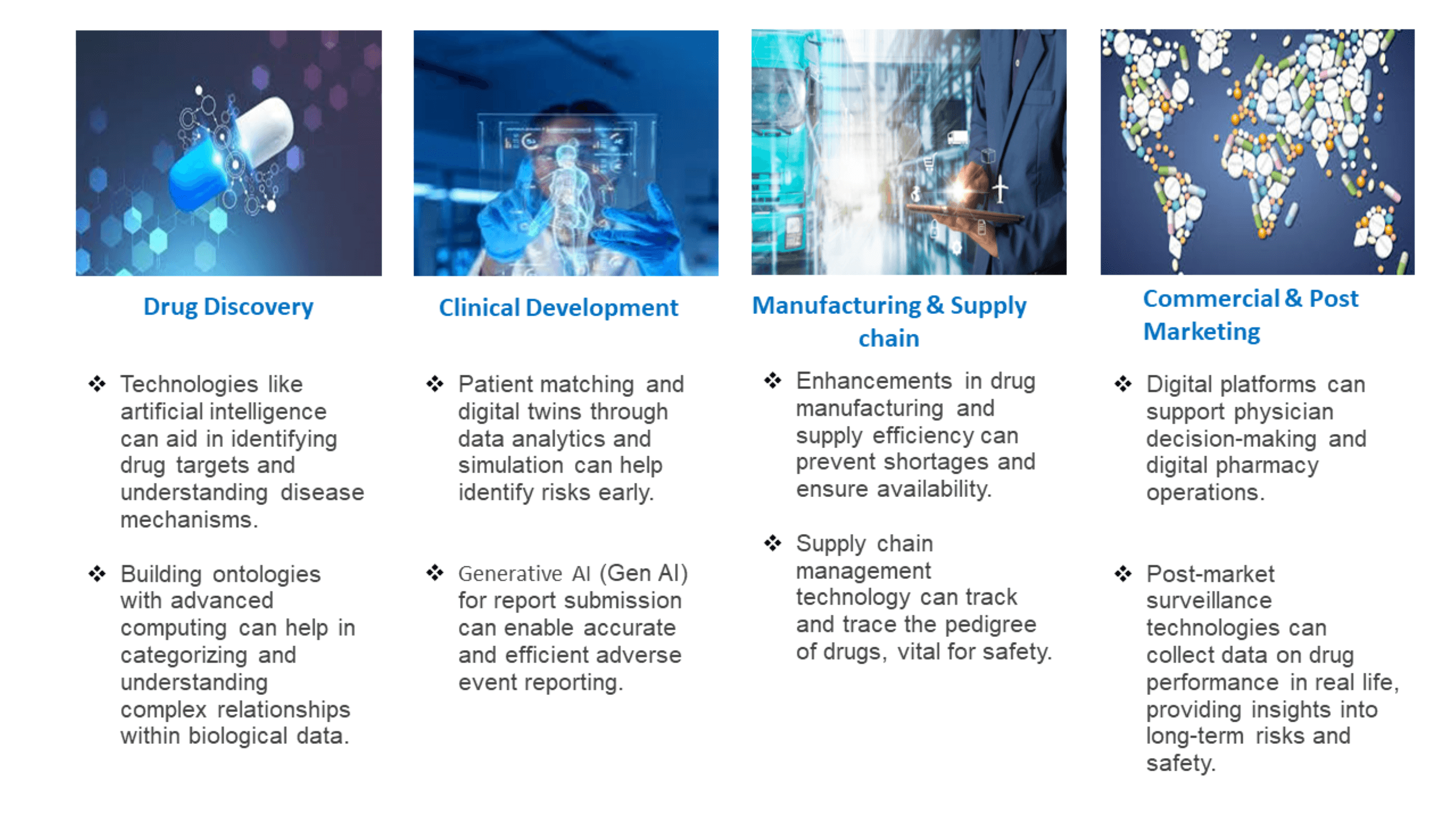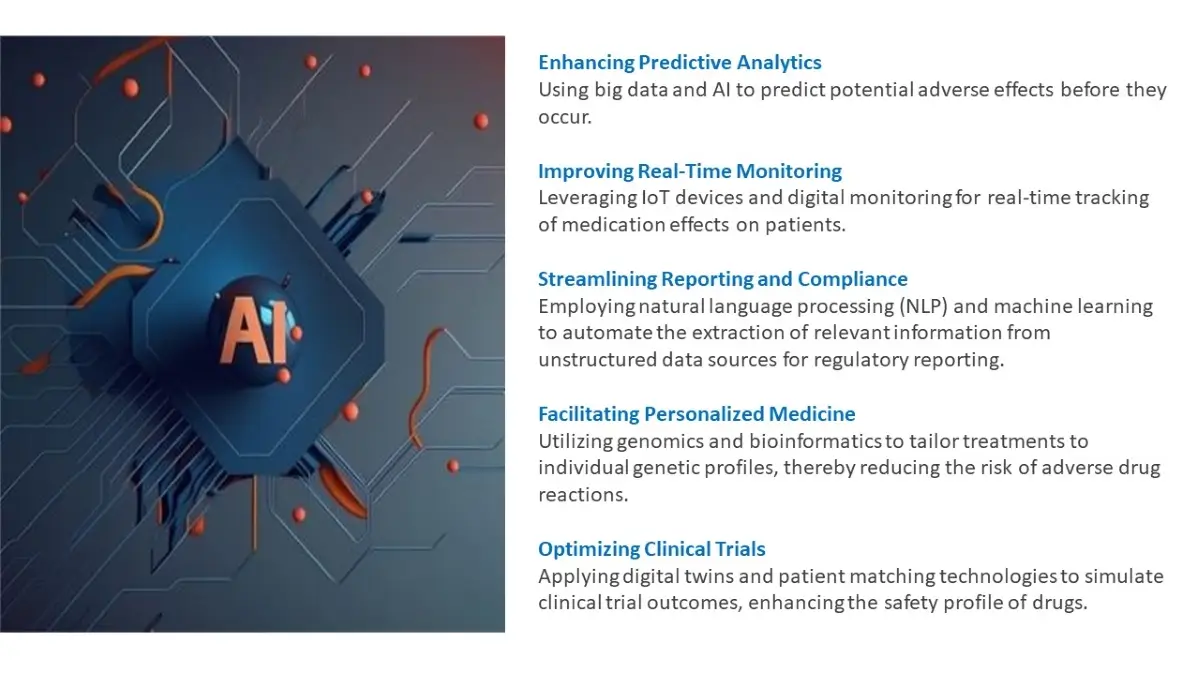In the dynamic landscape of life sciences, breakthroughs driven by Artificial Intelligence (AI) and Machine Learning (ML), along with the innovative capabilities of Generative AI (Gen AI), are heralding a new era of possibilities. These technologies are at the forefront of revolutionizing research, diagnostics, treatment, and patient care, catalysing unprecedented advancements in the field.
- Drug Discovery and Development: AI/ML is revolutionizing drug discovery by predicting drug-target interactions, optimizing drug design, and speeding up clinical trials. Gen AI, with its capacity to generate novel data and simulations, is aiding in the identification of new drug candidates and understanding complex biological processes.
- Diagnostics and Predictive Analytics: AI-powered tools are improving diagnostic accuracy and efficiency, especially in imaging and pathology. By analyzing medical images, AI can detect abnormalities and diseases at earlier stages. Predictive analytics are being used to anticipate disease outbreaks and patient outcomes, facilitating more proactive healthcare management.
- Personalized Medicine: Leveraging AI algorithms, healthcare providers can offer personalized treatment plans based on a patient’s genetic makeup, lifestyle, and other factors. This approach increases the effectiveness of treatments and reduces side effects, leading to better patient outcomes.
- Genomic Analysis and Gene Therapy: AI/ML is integral in analyzing complex genomic data, helping to identify genetic markers related to diseases and informing gene therapy strategies. Gen AI models can simulate genetic modifications, predicting their outcomes and optimizing therapeutic interventions.
- Operational Efficiencies in Healthcare: AI is streamlining administrative and operational tasks in healthcare organizations, from patient scheduling to inventory management. This operational efficiency can lead to reduced costs and improved patient care
Navikenz vision is to "Contribute significantly to the drug discovery to post market management value chain through relevant technology solutions."
We leverage technology to enhance every step of the drug's lifecycle. By doing so, we aim to improve the efficiency and safety of drug development and monitoring processes, reduce costs, and ultimately ensure that the medications that reach consumers are as safe and effective as possible. The integration of AI and ML within these processes is not just an operational improvement but is transformative, potentially leading to better health outcomes and innovations in patient care.
Where Emerging Technologies Integrate into the Industry

Emerging technologies facilitate drug safety and risk management by:
Emerging technologies, especially Artificial Intelligence (AI) and Machine Learning (ML), are revolutionizing drug safety and risk management. These technologies offer unprecedented capabilities in identifying potential risks and ensuring the safety of pharmaceutical products throughout their lifecycle.
- Predictive Risk Assessment: AI and ML algorithms can analyze vast datasets, including historical clinical trial data and real-world evidence, to predict potential drug interactions and side effects. This predictive capability allows for early identification of safety concerns, well before they become widespread issues.
- Real-Time Monitoring and Surveillance: AI systems facilitate continuous monitoring of drug performance in real-time, enabling immediate action in response to any signs of adverse effects or unexpected drug behavior. This real-time surveillance ensures that any potential risks are managed proactively, safeguarding patient health.
- Enhanced Decision-Making: By integrating AI with data analytics, researchers and healthcare professionals can make more informed decisions regarding drug development and patient care. AI-driven insights help in understanding the nuanced relationships between different variables, leading to safer and more effective therapeutic outcomes.
- Automation of Regulatory Compliance: AI tools can automate the tracking and reporting of adverse drug reactions, ensuring compliance with regulatory standards and facilitating faster and more accurate reporting processes. This not only helps in maintaining public trust but also speeds up the process of getting safe drugs to the market.

The adoption of Artificial Intelligence (AI) and Machine Learning (ML) in life sciences, particularly in the context of drug safety and risk management, signifies a transformative shift. These technologies empower the industry with predictive risk assessment, real-time monitoring, enhanced decision-making, and automated regulatory compliance. This comprehensive suite of tools is instrumental in advancing drug development processes, ensuring that safety and efficacy remain paramount. Through the strategic use of AI and ML, the life sciences sector is better equipped to navigate the complexities of modern healthcare challenges, leading to more reliable and effective outcomes in drug management and patient care.
Warning: Undefined array key 0 in /var/www/wp-content/themes/CandyPress/single-industries.php on line 231
Warning: Trying to access array offset on value of type null in /var/www/wp-content/themes/CandyPress/single-industries.php on line 231
NULL
